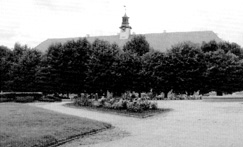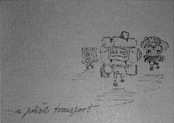
When the train pulled into Theresienstadt, John and the others had their first taste of what to expect. Fierce guards surrounded them, bellowing orders as the Jews descended from the train and assembled on the platform. “Move ahead!” the guards shouted, kicking and pushing anyone who moved too slowly. They all quickly fell into line, trying to avoid this abuse. Then they were marched toward a warehouse, to await further orders.
Theresienstadt was a dirty, barren town consisting mainly of three-story brick buildings, much like the apartment buildings in Budejovice, but run-down. Other, smaller houses stood between the taller buildings. These buildings surrounded a large fenced square, a muddy wasteland in the center of town. A high wall patrolled by the guards enclosed the entire town.
The town was packed with Jewish prisoners from all over Czechoslovakia and other parts of Europe. Men, women, and children shuffled through the streets with their heads down, dressed in rags, moving silently. Soldiers patrolled the small cobblestone streets, brandishing rifles. Guard dogs strained at their leashes and barked ferociously as the prisoners walked by.


Left: The central square in the town of Terezin today. Right: A drawing of prisoners as they arrive at Theresienstadt, carrying their possessions.
In the dark warehouse, families searched for a corner where they might have some space and privacy. But the warehouse quickly became crowded, and people had to lie pressed closely against each other. John slept little that night. He lay with his head close to his father’s back, his mind racing. There was a desperate feeling in the air. He could sense it in the strained faces of the adults around him. He could see it in the grimness on the streets and in the buildings, in the guards who patrolled nearby. And he could feel it in the hunger pangs that were already gnawing at his stomach. He moved closer to his father for comfort.
The next day, they had to line up outside to be counted again. John was exhausted, and stood timidly in line, wondering if they would be given a real place to sleep and when they would receive some food. The count seemed endless, but eventually the guards reached the families of Budejovice.
“Get into lines!” they shouted harshly. “Men on the left, women to the right, and children in a separate line over here.”
John’s heart beat wildly as this news settled in on him. Families were to be separated! Women were being sent to one large barracks, men to another, and boys and girls to two other barracks. There was mass confusion as parents all around him clutched their sobbing children. John had never been away from his family, and here in this walled prison the notion was even more alarming. He felt terror creeping over him. Where was he going? Would he ever see his parents again?
“John!” his mother cried, holding him. “We will come and find you. We’ll be with you as soon as we can.” He clung to her neck, unable to respond. He had barely a moment to say goodbye to his parents before he was ordered into the line of boys and marched away.
Desperately, he searched the crowd of boys for familiar faces, and there suddenly was Beda. Though they couldn’t talk, their eyes met, a brief but reassuring glance. At least John had his good friend nearby. As he lugged his suitcase down the road with the other boys, he thought about Budejovice, and he remembered the times when he had tested his courage by jumping from the streetcar, or by climbing the Black Tower.
Survival here, in this prison, would take a very different kind of courage.